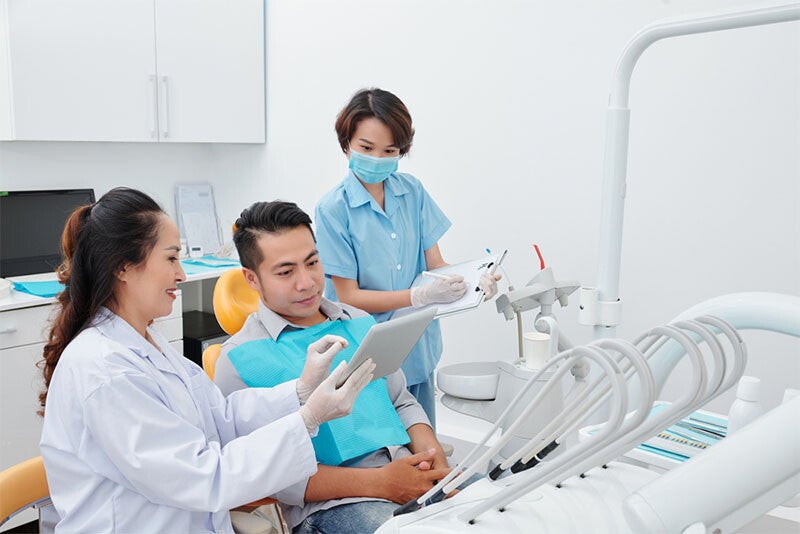
A Dad's Guide to Essential Medical Checkups From Age 25 Onwards
Did you watch the K-drama When Life Gives You Tangerines? The hardworking dad there ignored the pain in his knees and relied on cold compresses for a long time. And when he finally got diagnosed by a doctor, it turned out to be far more serious.
When juggling work and raising kids, it’s easy to brush regular medical checkups off. But, taking care of yourself isn’t just a box to tick. You’re showing up for your family now and all the milestones ahead.
So, Dad, stop chalking up that lingering cough to the weather or the constant fatigue to puyat or stress. Here are the reasons routine checkups are essential and the key screenings to consider starting at age 25.
Why Medical Checkups Are Important
Regular checkups can help your doctor establish a baseline and catch "silent killer" conditions like high blood pressure (hypertension). A study in Acta Medica Philippina found that Filipino men often show higher rates of elevated blood pressure compared to women.
Ischemic heart disease ranks as another consistent top cause of death among men, based on data from the Philippine Statistics Authority (PSA) in 2023.
So, Dad, don’t delay doctor visits until a problem becomes serious! Scheduling a health screening can help you:
- Catch potential health issues before they escalate. Many serious conditions have silent symptoms in their early stages.
- Understand your health risks based on family history and lifestyle.
- Maintain the energy and stamina needed to be an active and engaged father.
Medical Checkups for Dads Starting at Age 25

Regular medical checkups empower dads to stay healthy for every precious family moment for years ahead.
If you’ve got HMO coverage, make the most of the checkups like an annual physical exam. It’s already a great first move to put you on the right track health-wise. From there, here's a guide to the most essential medical screenings starting as early as age 25.
1. Annual physical examination (APE)
Your doctor will check your vital signs, assess your BMI, and examine your heart and lungs. This checkup sets your health baseline, catches early signs of disease, and helps address lifestyle habits, especially those that increase your risk of chronic diseases, from diabetes to heart failure.
Frequency: Once a year
2. Blood pressure (BP) monitoring
This test checks blood pressure against your artery walls. High blood pressure often shows no symptoms but raises your risk of heart disease and stroke.
Frequency: During every doctor’s visit or at least once a year if your BP is normal. You may need to check more often if you have risk factors.
3. Cholesterol (lipid profile) and blood sugar (glucose) tests
These fasting blood tests measure your cholesterol levels (total, LDL, HDL, and triglycerides) and blood sugar. While you can test just for diabetes and cholesterol, they’re often part of basic blood test panels or comprehensive health packages in hospitals and diagnostic clinics.
High cholesterol contributes to artery-clogging plaque, increasing heart disease risk, while elevated blood sugar can indicate prediabetes or diabetes. Timely diagnosis through these blood tests helps you make the necessary lifestyle changes, like healthier eating and exercise.
Frequency: Cholesterol screening typically starts at age 35 (earlier with risk factors) and repeats every three to five years if normal. Diabetes screening begins around age 35 to 45, or earlier if you're overweight or at risk. If you don’t have access to APE, ask your doctor how often you should have these tests based on your specific health profile.
4. Dental checkups

More than just a cleaning, dental checkups are an important part of your overall health routine.
A regular checkup with your dentist includes a professional cleaning to remove plaque and tartar buildup. They’ll also examine your teeth and gums for signs of decay or disease (like gingivitis or periodontitis).
The benefits of good oral health also go beyond eating properly or smiling with confidence. A 2025 study in the International Journal of Cardiology Congenital Heart Disease shows a healthy mouth helps control harmful bacteria that could enter your bloodstream and affect your heart. So, don't skip dental visits!
Frequency: Every six to 12 months, or as recommended by your dentist
5. Vision exams
A comprehensive eye exam checks your visual sharpness and screens for eye diseases like glaucoma and cataracts. For routine vision checks for your eyes, you can visit an optometrist, who can perform these tests and prescribe corrective lenses. If they find more serious issues, they’ll refer you to a doctor specializing in eye diseases and surgery (an ophthalmologist).
Eye exams may also detect early signs of other health issues, like diabetes or high blood pressure, both common diseases in the Philippines.
Frequency: Get a checkup every one to two years, or as advised by your eye doctor.
6. Skin health checks
This involves regular skin checks for new or changing moles and lesions. While skin cancer is less common in Filipinos than in fairer populations, it still occurs, and catching it early is key.
Frequency: Self-check monthly. Ask your doctor or dermatologist about a full-body skin exam annually or as needed.
7. Mental health checks
The stresses of life and fatherhood can also impact mental well-being. Depression, anxiety, and stress-related disorders are real and treatable. But a 2024 study published in Advances in Mental Health found that seeking support can be particularly difficult for Filipino men.
If you’ve been feeling off and want to check in with yourself, the MindSG program has online self-assessment tools that can help. Just remember that these online tools are for self-reflection and are not a medical diagnosis. Don't hesitate to speak with your doctor about how you’ve been feeling.
Frequency: Anytime you experience prolonged stress or mood changes
8. Colorectal cancer screening
This health screening looks for signs of cancer in the colon or rectum before symptoms develop, usually through the Fecal Immunochemical Test (FIT) or a colonoscopy. Colorectal cancer is often highly treatable when detected early through regular screening.
Frequency: The DOST–Health Technology Assessment Council (HTAC) recommends the FIT annually, starting at age 50. You typically need a colonoscopy every 10 years. But if your doctor spots polyps or you have a family history of colon cancer, you may need a colonoscopy every three or five years.
9. Prostate cancer (PCa) screening
Prostate cancer screening isn't a single test. So, your doctor may recommend c the Prostate-Specific Antigen (PSA) blood test to measure the level of PSA protein in your blood and a Digital Rectal Exam (DRE). A 2024 study published in Frontiers in Urology noted rising prostate cancer rates in the Philippines, making early diagnosis more important.
Frequency: There’s no one-size-fits-all screening schedule for PCa. Talk about it with your doctor as you get older, generally starting around age 55 or earlier if you have a family history of PCa.
Common Health Concerns for Pinoy Men
Routine medical checkups help you catch potential health issues early, especially conditions you can prevent with lifestyle tweaks. These include:
- Cardiovascular diseases: Ischemic heart disease and stroke consistently rank as the top causes of death among Filipinos in 2024, according to data from PSA.
- Diabetes mellitus: This leading cause of death in the Philippines identifies family history, obesity, and an unhealthy diet as risk factors.
- Respiratory illnesses: Chronic lower respiratory diseases like chronic bronchitis, emphysema, and asthma and tuberculosis also remain public health concerns.
- Cancer: Early cancer diagnosis through health screenings can be lifesaving.
Taking Charge of Your Health
Your family looks up to you, Dad, so it's important to be proactive about your medical checkups. Don't postpone that health screening or your annual physical examination. Prepare for your visit by listing any concerns, medications you're taking, and your family's medical history. Open communication with your doctor is key to a personalized health plan.
Visit the ParentTeam Moms and Dads Facebook group to connect with other dads for support. And remember, scheduling your medical checkup is essential to being the healthy, present father your family deserves.
References
Better Health Channel. "Health checks for men." Better Health Channel. Accessed May 13, 2025. https://www.betterhealth.vic.gov.au/health/healthyliving/health-checks-for-men (Note: Check the webpage for a "last updated" or "last reviewed" date to include if available.)
MedlinePlus. "Health screenings for men ages 18 to 39." MedlinePlus. Last reviewed August 1, 2023, editorial update September 26, 2024. Accessed May 13, 2025. https://medlineplus.gov/ency/article/007464.htm
MedlinePlus. "Health screenings for men ages 40 to 64." MedlinePlus. Last reviewed May 20, 2024. Accessed May 13, 2025. https://medlineplus.gov/ency/article/007465.htm
NCD Alliance. "People living with NCDs are front and centre of the NCD response in the Philippines." NCD Alliance. November 7, 2023. Accessed May 13, 2025. https://ncdalliance.org/news-events/news/people-living-with-ncds-are-front-and-centre-of-the-ncd-response-in-the-philippines
Philippine Society of Hypertension. "Executive Summary of the 2020 Clinical Practice Guidelines for the Management of Hypertension in the Philippines." Philippine Society of Hypertension. Published August 3, 2021. Accessed May 13, 2025. https://pmc.ncbi.nlm.nih.gov/articles/PMC8678709/
Vemu, Prasantha L., Eugene Yang, and Joseph Ebinger. "2023 ESH Hypertension Guideline Update: Bringing Us Closer Together Across the Pond." American College of Cardiology. February 5, 2024. Accessed May 13, 2025. https://www.acc.org/Latest-in-Cardiology/Articles/2024/02/05/11/43/2023-ESH-Hypertension-Guideline-Update
World Health Organization. "Noncommunicable diseases." World Health Organization. December 23, 2024. Accessed May 13, 2025. https://www.who.int/news-room/fact-sheets/detail/noncommunicable-diseases
World Health Organization. "Noncommunicable diseases." World Health Organization. Accessed May 13, 2025. https://www.who.int/health-topics/noncommunicable-diseases#tab=tab_2









